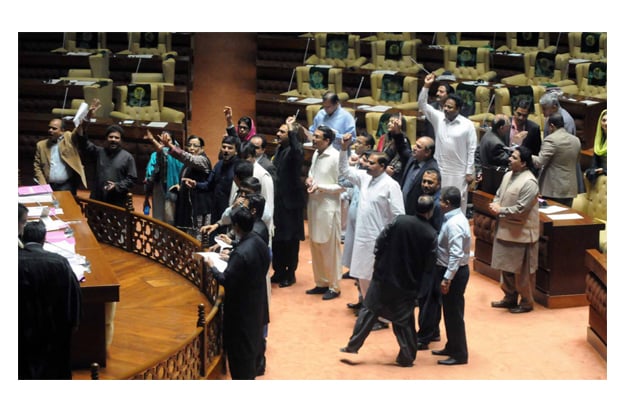
Amid the opposition’s vehement protests, the Sindh Assembly passed a law on Friday allowing prosecutors to withdraw terrorism cases against any suspect at any stage with the court’s consent.
The latest amendments to the criminal prosecution law authorises the provincial government to withdraw pending cases before the court announces its judgment. The law also fixes the tenure of the prosecutor general for three years.
Govt pleads ignorance on Sindh terror financiers
These legislative changes have been made at a time when the Sindh government and the Centre are already at loggerheads over the policing powers of Rangers as well as the ongoing trial of former minister Dr Asim Hussain on terrorism charges.
Under the Sindh Criminal Prosecution Service (Constitution, Function and Powers) Amendment Bill, 2015, the district prosecutors and prosecutor general of Sindh have been authorised to act on behalf of provincial government to withdraw charges punishable by up to three and above seven years of jail terms.

The law also empowers the prosecutors to call a report from the law enforcement agencies in relation to any investigation.
This clause has been inserted into the law seemingly because the Rangers do not share any details of their investigations until the 90-day preventive custody comes to an end.
While the amendment bill was on Friday’s agenda just for introduction, the ruling Pakistan Peoples Party put the proposal before the house for consideration.
All opposition parties, except the Pakistan Muslim League-Nawaz, joined the protest against the bill.
Govt pleads ignorance on Sindh terror financiers
The Muttahida Qaumi Movement lawmakers, who have also expressed reservations against the Rangers targeted operation, went on to tear the agenda copies.
“No no. Go go...” shouted the protesting lawmakers in front of the speaker’s podium.
Opposition leader in Sindh Assembly Khawaja Izharul Hasan of the MQM said: “This law is being passed to save criminals and defend corruption.”
The prosecution law’s Clause-8, which was amended with majority votes, now reads: “The prosecutor general or any prosecutor authorised by him may, for reasons to be recorded in writing, inform the court on behalf of the government that he/she shall not prosecute the accused. Therefore, all proceedings against the accused person shall be stayed and he shall be discharged: such discharge shall not amount to an acquittal unless the court directs otherwise.”
Another amendment was regarding the tenures of prosecutor general. The term has been fixed for three years; giving a message the government will not succumb to any pressure to remove the prosecutor from his post.
Earlier this sub-section read: “The government may remove the prosecutor prior to his tenure.”
This clause has now been omitted while the prosecutor general also given the powers of transferring and posting any officer in his department. Earlier, this was done by the home department, which falls under the domain of the provincial chief executive.
Police withdraw terror charges against Dr Asim
Sindh Education and Parliamentary Affairs Minister Nisar Ahmed Khuhro, who moved the bill, said the amendments were introduced to comply with the superior court orders on administrative control of Sindh Prosecution Service. He, however, clarified all cases would be withdrawn with the consent of court.
But the opposition leader retorted the court could do nothing when the prosecutor himself wanted to withdraw the case.
Published in The Express Tribune, January 16th, 2016.
1732434981-0/BeFunky-collage-(10)1732434981-0-405x300.webp)




1732433856-0/Untitled-design-(6)1732433856-0-270x192.webp)
1732429143-0/BeFunk_§_]__-(44)1732429143-0.jpg)
1732428532-0/BeFunk_§_]__-(43)1732428532-0.jpg)

1732427746-0/Copy-of-Untitled-(2)1732427746-0-270x192.webp)







COMMENTS (9)
Comments are moderated and generally will be posted if they are on-topic and not abusive.
For more information, please see our Comments FAQ